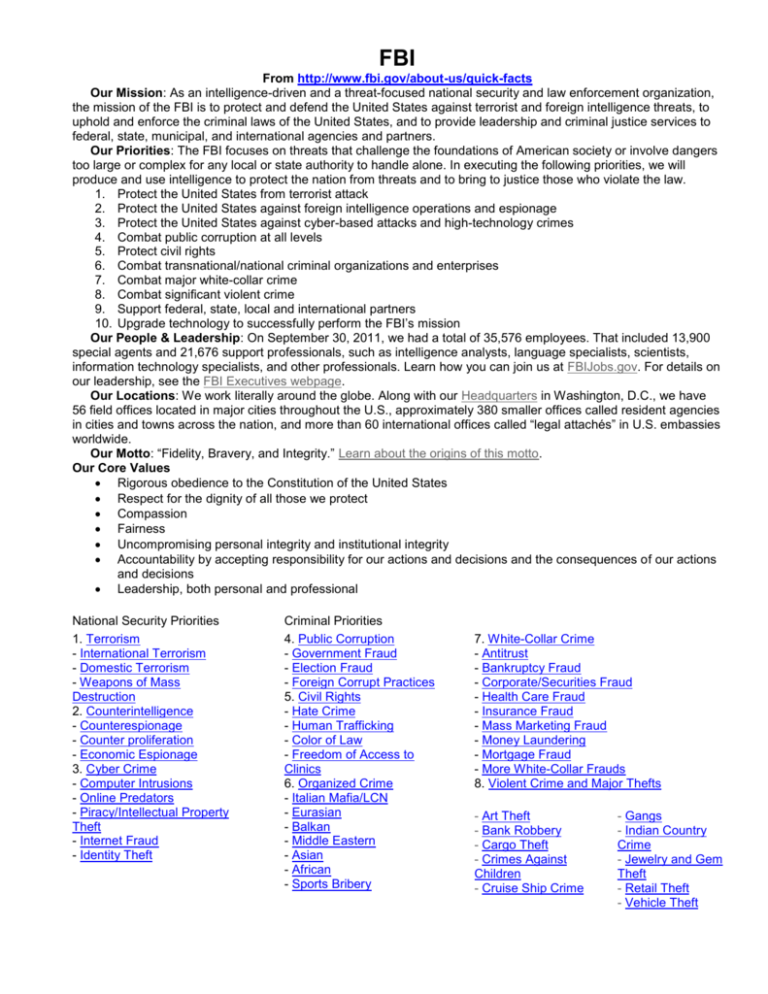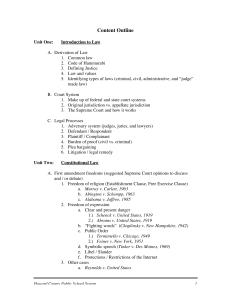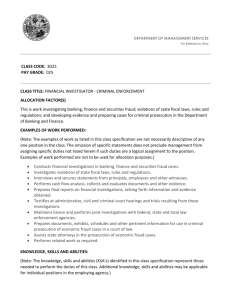FBI - kturner4khs
advertisement

FBI From http://www.fbi.gov/about-us/quick-facts Our Mission: As an intelligence-driven and a threat-focused national security and law enforcement organization, the mission of the FBI is to protect and defend the United States against terrorist and foreign intelligence threats, to uphold and enforce the criminal laws of the United States, and to provide leadership and criminal justice services to federal, state, municipal, and international agencies and partners. Our Priorities: The FBI focuses on threats that challenge the foundations of American society or involve dangers too large or complex for any local or state authority to handle alone. In executing the following priorities, we will produce and use intelligence to protect the nation from threats and to bring to justice those who violate the law. 1. Protect the United States from terrorist attack 2. Protect the United States against foreign intelligence operations and espionage 3. Protect the United States against cyber-based attacks and high-technology crimes 4. Combat public corruption at all levels 5. Protect civil rights 6. Combat transnational/national criminal organizations and enterprises 7. Combat major white-collar crime 8. Combat significant violent crime 9. Support federal, state, local and international partners 10. Upgrade technology to successfully perform the FBI’s mission Our People & Leadership: On September 30, 2011, we had a total of 35,576 employees. That included 13,900 special agents and 21,676 support professionals, such as intelligence analysts, language specialists, scientists, information technology specialists, and other professionals. Learn how you can join us at FBIJobs.gov. For details on our leadership, see the FBI Executives webpage. Our Locations: We work literally around the globe. Along with our Headquarters in Washington, D.C., we have 56 field offices located in major cities throughout the U.S., approximately 380 smaller offices called resident agencies in cities and towns across the nation, and more than 60 international offices called “legal attachés” in U.S. embassies worldwide. Our Motto: “Fidelity, Bravery, and Integrity.” Learn about the origins of this motto. Our Core Values Rigorous obedience to the Constitution of the United States Respect for the dignity of all those we protect Compassion Fairness Uncompromising personal integrity and institutional integrity Accountability by accepting responsibility for our actions and decisions and the consequences of our actions and decisions Leadership, both personal and professional National Security Priorities 1. Terrorism - International Terrorism - Domestic Terrorism - Weapons of Mass Destruction 2. Counterintelligence - Counterespionage - Counter proliferation - Economic Espionage 3. Cyber Crime - Computer Intrusions - Online Predators - Piracy/Intellectual Property Theft - Internet Fraud - Identity Theft Criminal Priorities 4. Public Corruption - Government Fraud - Election Fraud - Foreign Corrupt Practices 5. Civil Rights - Hate Crime - Human Trafficking - Color of Law - Freedom of Access to Clinics 6. Organized Crime - Italian Mafia/LCN - Eurasian - Balkan - Middle Eastern - Asian - African - Sports Bribery 7. White-Collar Crime - Antitrust - Bankruptcy Fraud - Corporate/Securities Fraud - Health Care Fraud - Insurance Fraud - Mass Marketing Fraud - Money Laundering - Mortgage Fraud - More White-Collar Frauds 8. Violent Crime and Major Thefts - Art Theft - Bank Robbery - Cargo Theft - Crimes Against Children - Cruise Ship Crime - Gangs - Indian Country Crime - Jewelry and Gem Theft - Retail Theft - Vehicle Theft STATE BUREAU OF INVESTIGATION From: HTTP://WWW.NCDOJ.GOV/ABOUT-DOJ/STATE-BUREAU-OF-INVESTIGATION.ASPX The State Bureau of Investigation is a division of the Department of Justice under the direction of Attorney General Roy Cooper. The SBI assists local law enforcement with criminal investigations. We work closely with local police and Sheriffs, district attorneys, federal investigators, and federal prosecutors. Jurisdiction: The SBI has statewide jurisdiction and investigates homicides, robberies, property crimes, and other serious cases. Involvement is at the request of the local department that maintains original jurisdiction over the case. The SBI has original jurisdiction in these areas: Drug Investigations Arson Investigations Election Law Violations Child Sexual Abuse in Day Care Centers Theft and Misuse of State Property Computer Crime Investigations that Involve Crimes Against Children Where We Work: The SBI headquarters is located in Wake County, with field agents located in eight districts across North Carolina. Specialized investigators in financial crimes, computer crimes, Medicaid fraud, and other disciplines are located around the state. The State Crime Lab is located in Raleigh, with a Western Regional Lab in Asheville and a Triad Regional Lab in Greensboro. FIELD OPERATIONS: SBI FIELD AGENTS PROVIDE EXPERT INVESTIGATIVE ASSISTANCE WITH CRIMINAL CASES WHEN REQUESTED BY LOCAL POLICE, SHERIFFS, DISTRICT ATTORNEYS, AND JUDGES. IN ADDITION, CRIMES ARE INVESTIGATED FOR WHICH THE SBI HAS ORIGINAL JURISDICTION (DRUGS, ARSON, GAMBLING, ELECTION FRAUD, AND CRIMES INVOLVING STATE PROPERTY) AS WELL AS INVESTIGATIONS TO SUPPRESS ORGANIZED CRIME AND VICE ACTIVITIES. MORE THAN 200 FIELD AGENTS AND CLERICAL PERSONNEL SERVE IN EIGHT DISTRICT OFFICES ACROSS NORTH CAROLINA. FIELD OPERATIONS INCLUDE: SBI FIELD PROCEDURE, FIELD DISTRICT OPERATIONS, AND SPECIAL INVESTIGATION UNITS IN ARSON, POLYGRAPH, AND CRIME SCENE SEARCH. SPECIAL OPERATIONS; THE SPECIAL OPERATIONS DIVISION HAS SEVEN SPECIALIZED INVESTIGATIVE AND OPERATIONAL UNITS: AIR WING UNIT, INTELLIGENCE SERVICES, COMPUTER CRIMES UNIT, MEDICAID CRIMINAL, CRIMINAL INFORMATION & IDENTIFICATION SECTION, INVESTIGATIONS UNIT, DIVERSION AND ENVIRONMENTAL CRIMES UNIT, SPECIAL SERVICES UNIT AIRPLANES AND SURVEILLANCE: THE AIR WING DUTIES INCLUDE AERIAL SURVEILLANCE, STATEWIDE COORDINATION OF THE MARIJUANA ERADICATION PROGRAM, INVESTIGATIVE PHOTOGRAPHY, INVESTIGATIVE RECONNAISSANCE, AND PRISONER TRANSPORTATION ASSOCIATED WITH CRIMINAL INVESTIGATIONS. Computer Crimes Investigations: Agents with the Computer Crimes Unit investigate crimes perpetrated by use of a computer, computer systems, or computer networks. The unit is responsible for statewide coordination of the investigation of computer and Internet Crimes. It is responsible for the administration of the North Carolina Internet Crimes Against Children (ICAC) Task Force funded by the US Department of Justice. Background Checks and Identification: The Criminal Information and Identification Section provides help to the SBI, law enforcement, and citizens of North Carolina with background checks and identification as well as crime reporting programs for criminal statistics. We are the central repository for criminal history information based on fingerprint identification. We operate the Statewide Automated Fingerprint Identification System (SAFIS). We also train, audit, and approve access to the DCI Network (DCIN), which is used to exchange criminal justice and law enforcement information within NC state and nationwide. Assisted by the Department of Justice IT Division, we maintain and oversee the NC Sex Offender Registry with information supplied by North Carolina Sheriffs. Prescription Drug Theft and Environmental Crimes: The Diversion and Environmental Crimes Unit conducts specialized criminal investigations involving diversion of controlled drugs by physicians, pharmacists, nurses, and other health care professionals. We also investigate drug diversion (theft committed by fraud), sometimes by organized drug rings. We investigate environmental crimes that involve the illegal storage, transportation, or disposal of hazardous waste, illegal discharges into state waterways, air quality violations, and other state or federal environmental crimes. Crime Tips and Information Analysis: Intelligence Services is responsible for the collection, classification, and sharing of criminal intelligence information to local, state, and federal law enforcement. The unit also oversees the management and daily operation of the NC fusion center ISAAC, Information Sharing and Analysis Center in partnerships with other state, local, and federal agencies. Medicaid Criminal Investigations: The Medicaid Criminal Investigations Unit investigates fraud committed by Medicaid health care providers and the physical abuse of patients in the Medicaid-funded facilities. The unit investigates embezzlement, theft, violations of federal sanctions, and the improper commingling of patients’ funds in Medicaid-funded facilities. A Medicaid provider includes any individual, corporation, or other entity, and their officers and employees, paid by Medicaid for providing a health care service. The Medicaid Criminal Investigations Unit works with NC Department of Justice attorneys, investigators, and auditors, all of whom are trained in the complexities of health care fraud investigation and health care fraud litigation. In addition, the unit works closely with United States attorneys, district attorneys, federal and state law enforcement agencies, and private insurance company fraud units. In the past fiscal year, such collaborative work has resulted in the recovery of approximately $40 million dollars for the Medicaid Program. Specialized Skills in Technical Services, Drugs, Bombs, and Response The Special Services Unit has highly specialized agents assigned to the following investigative areas: Clandestine Laboratory Response Program handles explosive meth labs Crisis Negotiation with barricaded subjects and hostage takes Criminal Apprehension Program to track down and arrest fugitive and crime suspects as well as assist missing/endangered person cases Special Response Team responds to hostage situations, barricaded suspects, high-risk search warrants and arrests, or high-level security events Technical Services provides sophisticated assistance in audio, video, and surveillance Weapons of Mass Destruction/Hazardous Devices handles bombs, biological weapons, and other explosives Wake County Sheriff's Office From: http://www.wakegov.com/sheriff/ The Sheriff's Office is the primary law enforcement agency for the unincorporated areas of the County. Wake County voters elect the Sheriff to four-year terms. Law enforcement is a vital role of government at nearly all levels. CRIMINAL INVESTIGATIONS The Criminal Investigation Division is sub-divided into four primary workgroups--Administration, Drugs and Vice, Operations, and Special Operations. These divisions investigate alleged criminal activity. Each workgroup is further divided into specialized, well-trained and equipped units directly deployed to serve and meet citizens’ needs through comprehensive investigative functions and community interaction. OPERATIONS: PROPERTY CRIMES UNIT (NORTH & EAST AND SOUTH & WE ST) Two Property Crimes Units, comprised of one Sergeant and seven investigators, investigate crimes of theft and damage to property, residential and commercial break-ins, larcenies, and recovered stolen property. Person Crimes/Fraud Unit The Person Crimes Unit has one sergeant and nine investigators. Three investigators focus on fraud, white-collar, cyber crimes and Identity Theft. Six investigators are responsible for investigating crimes of violence --murder, rape, robberies, assaults and arsons. Their cases also include adult missing persons. Juvenile Crimes Unit The Juvenile Unit consists of one Sergeant and six investigators who manage all criminal cases involving offenders and victims under the age of 16. The Juvenile Unit also investigates missing persons under the age of 18, child abuse, and sexual predators cases. Drugs & Vice Unit This unit of the Criminal Investigations Division conducts overt and covert operations and investigates all alleged drug complaints and illicit drug activity. Drugs and Vice also apprehend violators of the NC Controlled Substance Act and investigates other vice offenses such as illegal gambling and prostitution. TThe Impact section is an interdiction team that conducts enforcement operations designed to arrest criminal offenders and suppress a wide variety of criminal activity from street drug sales to traffic violations. SPECIAL OPERATIONS UNIT: Special Operations Unit consists of five separate squads: Canine Handlers (K-9), Special Response Team (SRT), Sheriff’s Traffic Observation Patrol (STOP) and Impact Team. The K-9 Unit patrols Wake County, answers calls for service, and responds to requests from patrol units and other agencies for tracking suspects, missing persons, and locating illicit drugs in vehicles, enclosed structures, and outdoor terrain. The SRT Unit specializes in the area of high risk entries such as search warrants and felony warrant service, barricaded suspects, and active shooter incidents. The SRT unit is on call 24 hours a day to respond to these types of incidents and other manpower or support issues for the Wake County Sheriff’s Office and other agencies. The STOP Unit specializes in traffic enforcement on secondary roads and subdivisions in Wake County. The STOP unit is funded by the Governors Highway Safety Program, tasked to target traffic related issues such as drunk drivers, child safety seat violations, complaints for speeding and reckless driving. ADMINISTRATION UNIT: The Administration Unit consists of the Criminal Intelligence Unit (CIU), Gang Investigation Unit (GIU), School Resource Officer Program, Criminal Analysis and Clerical Staff. Criminal Intelligence Unit and Gang Investigation Unit: The CIU and GIU are deployed jointly and independently. They gather criminal intelligence from a variety of sources and investigate the following crime categories: Criminal Street Gangs Extremist Groups Organized Crime Groups Terrorists, Domestic and International Threats to Law Enforcement and Public Figures Explosive Devices and Bomb Threats The School Resource Officer (SRO) Unit: The SRO Program helps provides a safe atmosphere conducive for learning in the county’s middle and high schools. The program also focuses on the safety of students, staff, and visitors at our schools. The SROs work to decrease criminal offenses committed against persons and property and to enhance overall safety. The School Resources Officers are highly visible on campuses but unpredictable in their movements. We help students not only learn more about law and the Criminal Justice System, but also familiarize students with law enforcement personnel and their functions. SROs try to establish a close working relationship among law enforcement, students, parents and faculty. Law enforcement is their primary function, but they also teach classes and provide students in need with counseling or recommend outside agencies for assistance. Criminal Analysis Unit: The Criminal Analysis Unit uses the latest and most advanced software to map and chart crimes, criminal patterns and trends. Both the Patrol and Investigations Divisions use this information to assign projects and target areas of concern and interest. Clerical Staff: The Clerical Staff manages telephone calls, maintains the office files and ensures the proper dissemination of reports and related paperwork to the Offices of the Clerk of Court, District Attorney and general public. DETENTION The Wake County Sheriff’s Office Detention Division manages three detention facilities, the only such facilities that house adult detainees in Wake County. The Wake County Detention Annex and the Wake County Detention Center are both located on Hammond Road, approximately halfway between the cities of Raleigh and Garner. The third facility is located at the John H. Baker, Jr. Public Safety Center at 330 South Salisbury Street in downtown Raleigh. The three facilities have a total bed capacity of 1,312. Approximately 400 full and part-time staff provides health care, security and supervision services for the detainee population. Private vendors operate Food Services and Commissary Services. The detention operation at the John H. Baker, Jr. Public Safety Center receives all newly admitted detainees. In the last twelve months, the detention operation had admitted over 32,000 detainees. Approximately 1/3 or 12,000 of these admissions bonded out almost immediately or received conditions of release from a magistrate that permitted the detainee to leave the detention facility and spend their pre-trial period in the community. The in-house detainee population fluctuates considerably. In the last six months, the detainee population has fluctuated from a low of 1,123 to a high of 1,580. Wake County Sheriff’s Office facilities have some policies that differ from most other detention facilities nationwide. 1. Inmates are not served coffee while incarcerated. 2. Inmates cannot smoke. No tobacco products are allowed inside the jail. 3. Inmates can exercise inside and outside their cells; however, the Wake County Sheriff’s Office does not provide inmates with weights or body building facilities. 4. Sentenced inmates work in housekeeping and maintenance inside the detention facilities. 5. Each inmate is served a nutritious meal three times a day. A professional dietician approves the menu that meets the standards set forth by the State of North Carolina. To ensure no religious edicts are compromised, we do not serve pork. 6. Medical staff is on duty 24/7. Sheriff’s office staff, along with Wake County officials, are currently working with architectural firms in planning a second construction phase at the Wake County Detention Center. This phase would add an additional 672 beds and should be completed in early 2013. RALEIGH POLICE DEPARTMENT From: http://www.raleighnc.gov/home/content/Departments/Articles/Police.html The goal of the Raleigh Police Department is to make Raleigh one of the safest cities in America. To do that, we continually advance strategies that prevent crime. We find ways to engage the community in taking steps that help minimize opportunities for victimization. We explore appropriate policy direction with the Mayor and City Council. We seek solutions to the complex community problems that contribute to crime and disorder. And we enforce the laws and arrest the people who break them. DETECTIVE DIVISION The Detective Division conducts criminal follow-up investigations and initiates investigations involving vice, drugs, gangs, cyber crime, organized crime and other criminal activities and threats. Some detective personnel are assigned to units that are centrally located at the Department's headquarters, while others are distributed among the city's six police districts. Working independently and with others in the department, detectives employ investigative techniques and strategies to identify suspects and make arrests. They frequently utilize crime analysts who are equipped with modern technology that allows them to closely monitor criminal activity for early signs of crime patterns and trends. Centralized units include: Aggravated Assault Unit Burglary Apprehension Team Career Criminal Unit Crime Analysis Unit Cyber Crimes Unit Drugs & Vice Unit Fraud and Forgery Unit Fugitive Task Force Financial Crimes Unit Homicide Unit Intelligence Unit Robbery Unit Technical Assistance Response Unit Youth and Family Services Unit A detective sergeant supervises each centralized unit. Also, at least one detective sergeant is assigned to each police district to supervise the investigations performed by detectives working there. District detectives handle a broad spectrum of criminal cases including such major crimes as assaults, burglaries, larcenies, and robberies occurring in their geographic areas. In addition district detectives work closely with personnel from Detectives Division's centralized units, with other divisions of the Raleigh Police Department, and with other law enforcement agencies. FIELD OPERATIONS DIVISION Uniformed officers assigned to the Field Operations Division have the primary purposes of responding to calls for service from citizens and providing preventive patrol for all areas of the city. The calls for service handled by the officers are generated by Emergency 9-1-1 calls from citizens and from actions initiated by the officers themselves. The first responding officer to a 9-1-1 call is usually from the Field Operations Division. Officers assigned to this division are responsible for specific geographic "beats" of the city. These beat areas are the foundation for the department's district policing system. These officers patrol the same area every workday. This allows them to identify problem areas and citizen concerns so that proactive strategies can be developed to resolve them. They know any trouble spots and can often identify repeat offenders who live or visit within their district. Officers begin their career in this division. After receiving their initial training at the Raleigh Police Academy, recruits are assigned to experienced training officers. The recruits expand the basic knowledge obtained from the academy and are eligible for patrol duty after successfully completing field training. Field Operations personnel carry much of the workload generated by calls for service. In addition, these officers are alert for criminal activity and traffic violations that require immediate enforcement action. Officers work in partnership with citizens to help them make every neighborhood and business area a better place. Officers frequently initiate special operations that are designed to match the needs of their beats. They also engage in other projects designed to prevent crimes, deter criminal activity, or apprehend known offenders. Additionally, the division's officers are often called upon to work assignments such as the Christmas Parade, First Night Raleigh and other special events. SPECIAL OPERATIONS DIVISION The Special Operations Division is a compact and flexible organization that often sees the nature of its assignments change in response to crime trends and other identified special needs. The Division's closely monitors statistical information generated by the Department's Crime Analysts and the Records Section, along with intelligence gathered from the Field Operations District Commands and other sources. The Special Operations Division also maintains direct relationships both with district commanders and with the Detective Division, and it provides districts with resources that specifically target criminal activities and assist with investigations. The Special Operations Division schedule facilitates a unity of investigational and tactical teams that work together to form a joint force that is capable of effectively addressing nearly every possible situation. At any given time there is a Selective Enforcement Unit, Drug Enforcement Unit, and a Traffic Enforcement Unit available to work individually or as part of a team. The division is comprised of both sworn and civilian personnel. Major operational elements of the Special Operations Division include: Selective Enforcement Unit Drug Enforcement Unit Traffic Enforcement Unit Special Projects Unit K-9 Unit Animal Control Unit Police Desk Operations Mounted Unit Taxi Inspections







